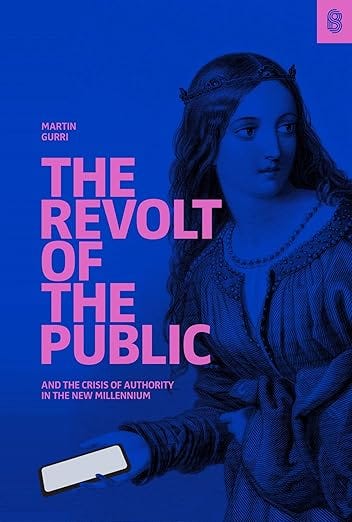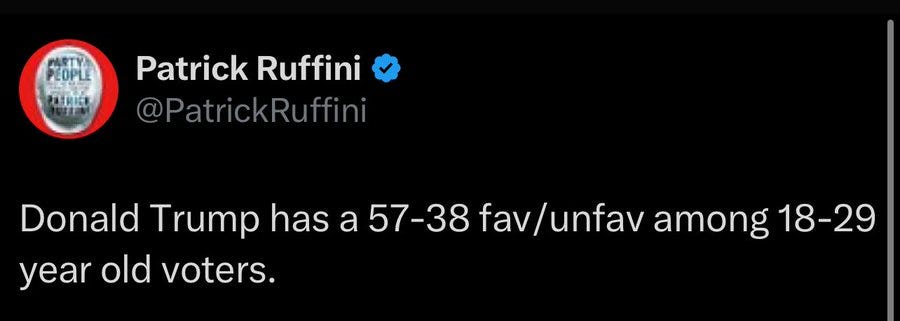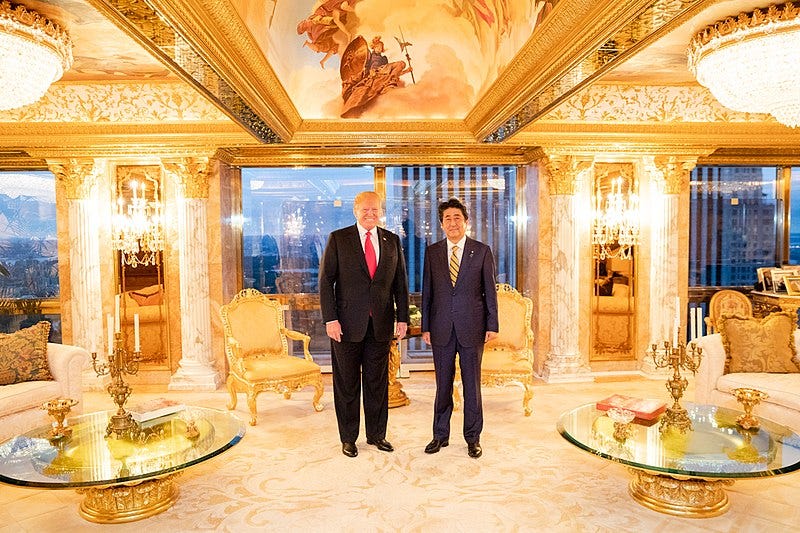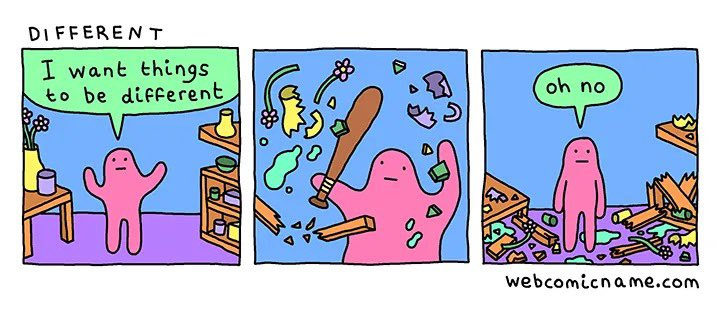Revolt and the Reversal of Trust
The digital roots of Trump's surprising youth popularity
The Revolt of the Public
Martin Gurri’s The Revolt of the Public is one of the most influential books I’ve read in the last 15 years. It’s shaped how I understand social media, politics and culture.
The thesis of Revolt of the Public, boiled down to the basics, is that due to social media everyone’s always mad about everything. And this will be a near-permanent state of affairs going forward. Elites, as a broad grouping, have almost always let the public down. There’s always been corruption, failures of leadership, failures of strategy, etc. But in previous generations, elites had a cozy relationship with the media and their failures were given soft treatment or swept under the rug entirely. In the digital age, that’s no longer possible. Modern technology and especially social media make it easy to see in real time how elites fail to live up to their promises. Thus: everyone mad, all the time, about everything.1
Crucially, Gurri argues this anger is potent but undirected. Martin Luther King had very distinct objectives when he marched on Washington DC. There was a formal leadership structure to his movement, they had a set agenda, they demanded specific legislation. Occupy Wall Street, by contrast, was just a thing that happened when some people saw some tweets and vaguely decided to yell in a park. They had no plan, no defined ideology, no legible demands, no movement outside of being really mad at the general state of things. Gurri states that modern protest movements are almost always against the current moment without being for any specific thing. It’s aimless lashing out at the system, at the elites.
One of the issues with Gurri’s work is that it’s actually too correct. Gurri began writing the book in 2011 in the wake of Occupy Wall Street, the Arab Spring and the indignados movement in Spain. He completely anticipated Brexit, Trump, and much of the turmoil that’s now engulfed the world. Scott Alexander’s review of the book states:
“…A lot of what Gurri considers wild speculation is now obvious fact. I picked up the book on its "accurately predicted the present moment" cred, but it predicted the present moment so accurately that it's barely worth reading anymore. It might as well just say "open your eyes and look around".
Gurri expects this to be the primary axis of political conflict moving forward. He calls this the Border vs the Center - those who are furious but directionless against the institutional elites invested in the current system. The primary question of our age is “Should we burn it all down?” without much thought to what comes next. The parallels to today’s politics are obvious.
Up is Down and Down is Up
Gurri calls this the Center vs the Border, but there are a lot of names ascribed to this type of conflict. Populism vs The Establishment. People vs Elites. High Trust vs Low Trust. Alt vs Mainstream. Cultural critic Ted Gioia memorably calls this the ‘Up vs Down’ paradigm. Under this paradigm, cultural conflict is no longer about Left vs Right but people who represent the down vs people who represent the up. Gioia:
Put simply, the masses hate experts. If forced to choose between the advice of the learned and the vague impressions of other people just like themselves, the masses invariably turn to the latter. The upper elite still try to pronounce judgments and lead, but fewer and fewer of those down below pay attention.
On a cultural level, this is why so many people trust Yelp reviews more than they trust professional food critics. On a political level, it’s almost exactly the same dynamic that Gurri describes. Up and Down here aren’t strictly economic classes - one could come from a working class background but share the views of the elites and identify with the ‘up’ wing of society. This is about attitudes, not class background or income.
You can look at nearly any political movement from the last 10-15 years and see this dynamic of up-vs-down. The Tea Party and Occupy Wall Street were both bottom-up expressions of rage against elites. Left wing climate activism throwing soup on paintings and right wing QAnon nuts share the same DNA in that they both target people at the top of some hierarchy. Whether it’s government officials, fossil fuel CEOS, celebrities, or tech companies, it’s always members of a distinguished elite minority that is at fault. Things that used to be high-status and trustworthy are now viewed with suspicion. And that which used to be low-status and contemptible is now appreciated.
Whatever you want to call this reorganization of political conflict, it’s the dominant axis of political conflict today. It’s especially the most dominant axis of conflict for those who are the most online - young people.
And I think it explains this:
Donald Trump, Hero of the Downtrodden
On the surface, it sounds absurd to think that Trump represents an anti-elite movement or the down axis. But he does.
The phrase itself is an oxymoron, but Donald Trump really does come off like a ‘blue collar billionaire’. Yes, despite Trump being born rich. Yes, despite Trump being the guy who literally surrounds himself with gold:
That’s exactly what a vulgar blue collar worker would probably do! Liberals have often remarked that Trump is a poor person’s idea of what a rich person is. They mean this as an insult, because to them billionaires should have sophistication and taste and subtlety. But this is the heart of Trump’s appeal.
The villain origin story for Donald Trump begins in New York society in the 80s and 90s. Trump was rapidly gaining wealth and desperate to be accepted into the city’s elite. The city’s elite wanted nothing to do with him. They saw Trump as vulgar, boorish, and stupid. This is commonly known in New York and less commonly known outside of it, but a lot of Trump’s unique psyche can be traced back to NYC’s high society and its complete rejection of him from their circles. Trump, of course, was furious at having been excluded from the Cool Kids’ Club and that fury is at the heart of his rejection of elite liberalism.
You can see Trump’s alignment with the Down in how he talks and how he looks. You can see it in his painfully tacky taste, in his ill-fitting suits, in his spray on tan and his terrible hair. He tweets like your drunk uncle posts on Facebook. You can sneer at all this, but it’s not a political weakness. It’s a strength. It aligns him with the most powerful trend in politics and culture - that whoever most visibly rejects the elites and the status quo is seen as more authentic and more trustworthy.
Gioia, reflecting on the new Down vs Up conflict, believes this is also changing the way we communicate:
We used to view formal speech as serious and impressive. Everything in that first column applied. The president would stand in public to give formal, scripted speeches to a large audience. That’s how presidents appeared… presidential. But in the age of social media, that mode of communication doesn’t resonate. What used to be considered serious is now considered stilted. What used to be respectable is now inauthentic, fake. And what used to be disrespectful is now authentic and sincere.
This is why Trump’s tour through the podcast circuit was so impactful, especially with young people. Politicians are all media trained to communicate in twenty second soundbites that can be endlessly played on cable news and social media, but that mode of communication now feels artificial. We yearn for the unscripted, for meandering conversations between two or more people, sitting down and chatting informally. And that’s what Trump excels at. If you like Trump, you’d say that he’s a great communicator who speaks like every day people. If you don’t like him, you still have to admit he’s a gifted bullshitter with a certain kind of charisma. Even his stump speeches are notorious for being improvised - they’re more like stream of consciousness story telling than like scripted sound bites. Those all-caps tweets and meandering speeches sound ridiculous to elites, to the Center, to the Up crowd. But he sounds authentic to the Border, to the Downs.
This thesis of anti-elite revolt is why viral ‘why I voted for Trump’ posts like this always start off with a feeling of ‘burn it all down’
As Gurri says, the mob isn’t necessarily for any coherent set of policies, they’re just against the current system. It’s far less important what ‘Coddled affluent professional’ is for and far more important what he’s against - the institutions and the elites that are lying to us. The very username gives away the game - this person hates the ‘up’ class of ‘coddled affluent professionals’. They hate people that claim to know better than them. Pete Buttigieg’s stupid smug face and stupid smug accomplishments makes them seethe with anger. Their post continues:
Policy really isn’t the point. The point is lashing out, and they’ll use any vehicle at all, including Trump, including sex predator Matt Gaetz, to lash out. It’s far more important to punish the elites than it is to accomplish anything constructive. This leads to stupid outcomes, of course:
But the truth is that this type of voter exists and will only become more prominent. When young, low trust, anti-elite people look at the current media and political landscape, they know they hate the system. And who looks more like the system - a standard Democrat giving a stump speech, or Trump rambling on about Hannibal Lecter and how great his real estate deals were? Who looks more elitist, a formal news anchor at CBS or Joe Rogan?
Democrats are increasingly the party of the college educated, the urban, the sophisticated. The working class leans Republican now, despite the ‘material conditions’ and class politics that indicate they shouldn’t. There are a number of indicators all pointing in this direction. Harris won with people who pay close attention to the news, she won with college educated folks, she won people who watch artistic French films. Trump won with people who don’t closely follow politics, with non-college voters, with pro-wrestling fans. He won them by a lot, and it’s all due to anti-elite sentiment.
I don’t think it’s a coincidence that the last time an incumbent party won the presidency was in 2012, right as the world was on the cusp of fully entering the smartphone/social media age. Since that point, society has been fully swallowed by the internet and incumbent parties have lost three presidential elections in a row. 2024 was the worst year for incumbent parties internationally in living memory. One of the consequences of ‘everybody is mad all the time at everything’ is that politicians (at least when running for president) no longer get an advantage from incumbency. There’s now an anti-incumbency bias, because whoever is in power becomes the focus of the blame.
The three most successful American politicians of the last decade have been Joe Biden, Bernie Sanders and Donald Trump. Trump and Biden are the only two who won presidential elections, and while Sanders didn’t win he wildly overperformed what a cranky socialist from Vermont should have been able to accomplish. Those three have wildly different ideological stances, but what they do have in common is that they speak like regular people and not in consultantese. Bernie sounds authentically angry and authentically anti-elite every time he speaks in his thick Brooklyn accent. Biden was known for ‘gaffes’ that only make him seem more real, like telling a voter Listen Here, Fat or his stories about Corn Pop. And we’ve covered Trump’s paradoxical everyman appeal.
A prediction - whoever wins the 2028 Democratic primary will be the candidate who speaks least like a Yale sociology professor and most like your cousin Joey who works down at the shop. Politicians have long sought to position themselves as for the people and against the elites. That’s not a new phenomenon, but it is especially strong in the age of social media. I don’t think there’s any sign this trend is slowing down, and it’s why social media and podcasts are now so unexpectedly important for politics.
I’m massively oversimplifying the book, which is worth picking up and reading in full.









"The real problem of humanity is the following: We have Paleolithic emotions, medieval institutions and godlike technology. And it is terrifically dangerous, and it is now approaching a point of crisis overall." - Edward O. Wilson
I think you described the intersection of these problems pretty well.
Are we entering an age of permanent revolution, where our institutions fail us and technology spurs the contagious emotion of outrage? What will become of our democracies (who respond to popular sentiment) and the autocracies (who try to insulate themselves from it)?
So basically the Internet has increased the voice of stupid people. Awesome. When stupid people voted for Trump back in 2016, I sympathized with their frustration and figured they didn't know how horrifically unqualified he was. Now I don't care how much the morons who voted for him suffer. You don't want "educated elites" telling you what to do? Great, good luck figuring it out with President Jackass.